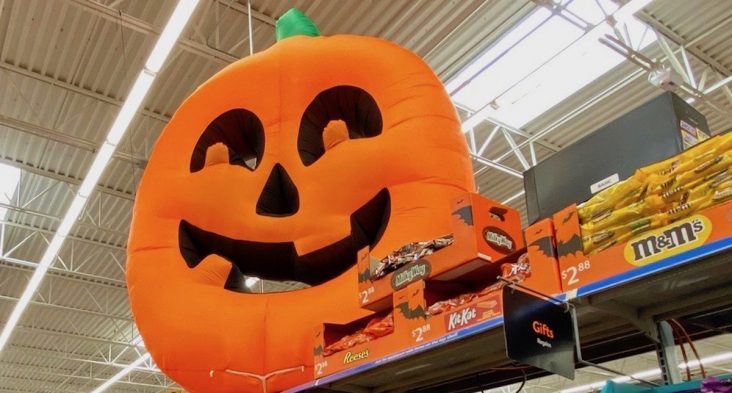Fewer Americans celebrating Halloween, but candy sales on the rise
by October 8, 2020 5:25 pm 918 views

Even though Halloween falls on a Saturday and will include a full moon for the first time in 95 years, a majority of Americans said COVID-19 is hindering their celebration plans.
The National Retail Federation expects Halloween spending to fall 8% this year to $8.05 billion, as just 58% of respondents said they will celebrate amid the pandemic. The trade group said plans for parties, trick-or-treating, handing out candy and visiting haunted houses have declined because of social distancing requirements. But, 17% said they plan to celebrate virtually. A bright spot in the data is that those celebrating are spending more on house decor and Halloween candy at an average of $91.12 per household.
“Consumers continue to place importance on celebrating our traditional holidays, even if by untraditional standards,” NRF President and CEO Matthew Shay said. “Retailers are prepared to meet the demand for seasonal décor, costumes and other items that allow families the opportunity to observe Halloween safely.”
Absent from the landscape are Halloween pop-up stores and advertisements for haunted houses which is tough for retailers who rely on seasonal promotions. Likewise, non-profits who host annual haunted houses as fundraisers will have to find other sources to replace lost revenue.
Party City said it would open just 25 Halloween pop-up stores this year, a 91% drop from the 275 stores it operated last year. One of the newest gadgets this year comes from specialty retailer Spirit Halloween and it’s a face-mask and bags on a stick so trick-or-treaters can collect candy at a safe distance.
Steven Silverstein, the CEO of Spirit Halloween, noted in a recent blog post: “At Spirit Halloween, we believe Halloween restores hopefulness and provides an outlet for escape, something we all need now more than ever. … When a rumor went viral that Spirit Halloween would not open due to the pandemic, we received an outcry from fans hoping it wasn’t true. We quickly assured them that’d we’d be back to open our doors and keep the Halloween spirit alive. We immediately saw an outpouring of enthusiasm for Halloween celebrations across social media.”
Silverstein said Halloween will look different for many this year, but the magic of the holiday is needed now more than ever for families and kids. He said the beauty of Halloween is that it is stress-free and designed to be outdoors. He said families are finding ways to participate in Halloween and still remain at social distances.
While costume sales are down, the Retail Federation survey indicates more than 2.7 million children plan to dress as their favorite princess character, more than 1.8 million as Spiderman, more than 1.6 million as their favorite superhero, more than 1.3 million as a ghost, and another 1.3 million will dress as Batman.
Nearly 70% of adults planning to dress up said they already know what their costume will be this year. More than 4.6 million adults plan to dress like a witch, more than 1.7 million as a vampire, more than 1.3 million as a cat, more than 1.1 million as Batman, and more than 1 million as a ghost.
The U.S. Centers for Disease Control and Prevention warns costume masks do not replace cloth masks which are still required in many states for people in public places.
Candy sales are higher this year. The National Confectioners Association reports chocolate and candy sales through the last month rose sharply from the same period last year. Halloween chocolate sales were 25.3% higher and candy sales overall rose 13%. The grocery channel is a key driver for the growth of Halloween chocolate and candy sales as consumer behaviors continue to evolve during the pandemic and more people shop at grocery stores more often. In the grocery channel alone Halloween chocolate and candy sales are up 17.1%.
The Association said there will be regional differences in the way people choose to celebrate the Halloween season. While fewer will trick-or-treat, more families are enjoying candy bowls at home throughout the entire month of October.
“If trick-or-treat tends to be a little lower than expectation, clearly we’ll focus even more on the ‘treat for me’ and the ‘candy bowl’ occasion,” Michele Buck, CEO of Hershey’s Company, said on a second-quarter earnings call in July. “We already shifted some of our portfolios to more everyday packaging to protect the downside, should Halloween sales be a little bit lighter, to really manage that liability.”
Halloween accounts for nearly 14% of candy companies’ annual sales and it’s the biggest holiday for this sector. Retailers from CVS, Target and Walmart report getting fewer large bags of candy from their suppliers like Hershey’s and Mondelez who said they are seeing far more online sales and families treating themselves.
